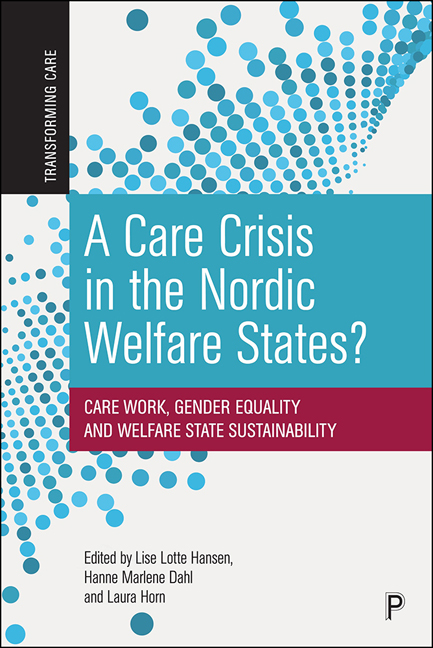 A Care Crisis in the Nordic Welfare States?
A Care Crisis in the Nordic Welfare States? Book contents
- Frontmatter
- Contents
- List of tables
- Notes on contributors
- Preface
- 1 Introduction: A care crisis in the Nordic welfare states?
- 2 The ‘care crisis’: its scientific framing and silences
- 3 Fraser’s care crisis theory meets the Nordic welfare societies
- 4 Crisis of care: a problem of economisation, of technologisation or of politics of care?
- 5 Deteriorating working conditions in elder care: an invisible crisis of care?
- 6 Managerialism as a failing response to the care crisis
- 7 ‘We are here for you’: the care crisis and the (un)learning of good nursing
- 8 Professionalisation of social pedagogues under managerial control: caring for children in a time of care crisis
- 9 Raising quality in Norwegian early childhood centres: (re)producing the care crisis?
- 10 Conclusion: Less caring and less gender-equal Nordic states
- 11 Postscript: A care crisis in the time of COVID-19
- Index
6 - Managerialism as a failing response to the care crisis
Published online by Cambridge University Press: 13 May 2022
- Frontmatter
- Contents
- List of tables
- Notes on contributors
- Preface
- 1 Introduction: A care crisis in the Nordic welfare states?
- 2 The ‘care crisis’: its scientific framing and silences
- 3 Fraser’s care crisis theory meets the Nordic welfare societies
- 4 Crisis of care: a problem of economisation, of technologisation or of politics of care?
- 5 Deteriorating working conditions in elder care: an invisible crisis of care?
- 6 Managerialism as a failing response to the care crisis
- 7 ‘We are here for you’: the care crisis and the (un)learning of good nursing
- 8 Professionalisation of social pedagogues under managerial control: caring for children in a time of care crisis
- 9 Raising quality in Norwegian early childhood centres: (re)producing the care crisis?
- 10 Conclusion: Less caring and less gender-equal Nordic states
- 11 Postscript: A care crisis in the time of COVID-19
- Index
Summary
Introduction
For several decades now, elder care services have been characterised by recurring crises in Finland. In 2006, a political scandal erupted when allegations became public of insufficient staff ratios in Koukkuniemi, the largest unit of institutional care for older adults in the Nordic countries at the time (Yle, 2006). In 2019, a scandal broke when the National Supervisory Authority for Welfare and Health (Valvira) ordered the closure of several care homes owned by private care companies due to severe neglect in the quality of care, and announced that they were investigating several complaints regarding deficiencies in elder care (Valvira, 2019). Valvira's lawyer described the situation in the first care home as an ‘acute crisis’, which is why it was closed down immediately (Tiessalo, 2019). The situation was described as a ‘care crisis’ by the media, expert commentators and opposition politicians as well as the Regional State Administrative Agencies (AVI, 2020).
Care crisis is understood here as referring to a situation in elder care that has reached a critical phase in relation to the quality of care, also involving public concerns over the quality and conditions of care work. While a crisis is commonly understood as a temporary disruption, for many people in the world, such as older adults in poor health, a crisis can become a lasting, endemic condition. Nevertheless, when a crisis has been identified by central actors in the field, action needs to be taken.
In Finland, a common line of action is routinely suggested as a solution to the crisis of elder care: improvements in the management of care. When developments and outcomes in elder care turn into a media frenzy and draw public attention to deficiencies and problems of all kinds from individual neglect and abuse to systematic understaffing, poor working conditions and widespread inadequate and inhumane treatment, at some point, the quality of management is identified as a key factor causing the strife, and hence better management is proposed as a solution to the crisis (for example Räsänen, 2011; Hoppania, 2015; Hoppania et al, 2017). However, very little public debate has emerged about what (good-quality) care management actually entails.
- Type
- Chapter
- Information
- A Care Crisis in the Nordic Welfare States?Care Work, Gender Equality and Welfare State Sustainability, pp. 100 - 119Publisher: Bristol University PressPrint publication year: 2021
